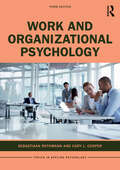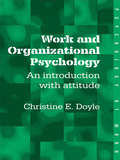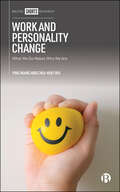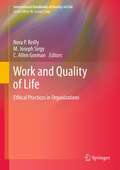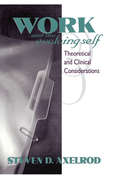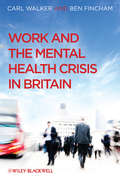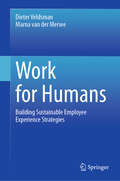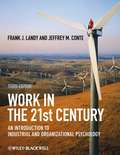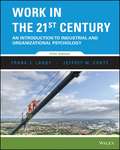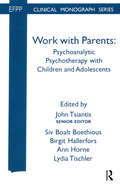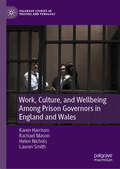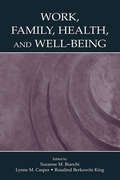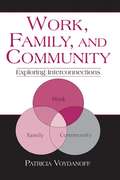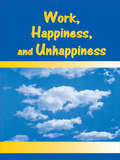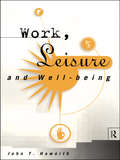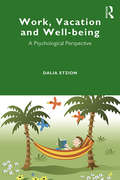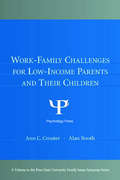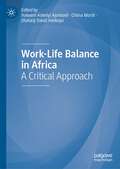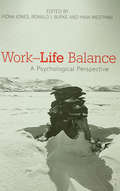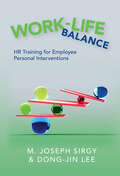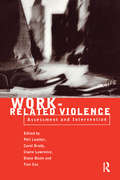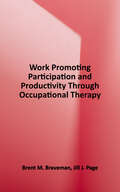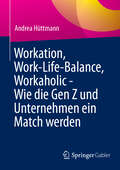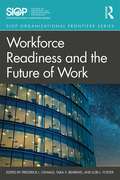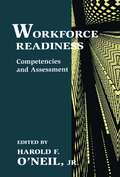- Table View
- List View
Work and Organizational Psychology (Topics in Applied Psychology)
by Cary L. Cooper Sebastiaan RothmannProviding a complete and contemporary overview of the evolving and fascinating world of work, this new edition of Work and Organizational Psychology is the perfect textbook, outlining not only key theoretical ideas, but how they relate to the role of psychologists advising today’s organizations. Integrating the fields of human resource management and organizational behaviour, the text begins with a chapter to give the reader an insight into the domain of work and organizational psychology, the development of the field of work and organizational psychology, tasks and competencies of organizational and work psychologists, and careers in work and organizational psychology. The remainder of the book is divided into thirteen chapters which address the core areas of work and organizational psychology. The book is supported by a range of pedagogical features, spotlighting issues of theoretical, ethical, or contemporary interest, whilst also enabling students to engage in active learning.
Work and Organizational Psychology: An Introduction with Attitude
by Christine DoyleIn this unique text, Christine Doyle provides the student with a cutting-edge introduction to the field of work and organizational psychology. The main focus is on recent changes that have occurred in the world of work, incorporating their causes, consequences, proposed solutions to the associated problems, and above all, the challenges they pose for work and organizational psychology.Among the topics covered are motivation at work, the concept of stress, and the causes of individual accidents and organizational disasters. Solutions to such problems might include lifelong learning and training, performance management, career development, and employee assistance programmes.This lively, provocative, and highly readable book will be an essential resource for advanced undergraduate and postgraduate students of work and organizational psychology, as well as business management students, managers and anyone with an interest in human resources management.
Work and Personality Change: What We Do Makes Who We Are
by Ying Wang Chia-Huei WuCan your job change your personality? While traditionally personality has been considered fixed and stable, recent thinking indicates that this is not the case. Personality can be changed by various work and vocational experiences, such as employment conditions, career roles, job characteristics and training or interventions. Drawing on a wide array of research in the field, Wang and Wu provide a conceptual overview on how personality can be changed at work by societal, organisational and job-related factors, while considering how individuals can take an active approach in changing their personality at work.
Work and Quality of Life
by M. Joseph Sirgy C. Allen Gorman Nora P. ReillyEmployees have personal responsibilities as well as responsibilities to their employers. They also have rights. In order to maintain their well-being, employees need opportunities to resolve conflicting obligations. Employees are often torn between the ethical obligations to fulfill both their work and non-work roles, to respect and be respected by their employers and coworkers, to be responsible to the organization while the organization is reciprocally responsible to them, to be afforded some degree of autonomy at work while attending to collaborative goals, to work within a climate of mutual employee-management trust, and to voice opinions about work policies, processes and conditions without fear of retribution. Humanistic organizations can recognize conflicts created by the work environment and provide opportunities to resolve or minimize them. This handbook empirically documents the dilemmas that result from responsibility-based conflicts. The book is organized by sources of dilemmas that fall into three major categories: individual, organizational (internal policies and procedures), and cultural (social forces external to the organization), including an introduction and a final integration of the many ways in which organizations can contribute to positive employee health and well-being. This book is aimed at both academicians and practitioners who are interested in how interventions that stem from industrial and organizational psychology may address ethical dilemmas commonly faced by employees.
Work and the Evolving Self: Theoretical and Clinical Considerations
by Steven D AxelrodIn Work and the Evolving Self, Steven Axelrod begins to remedy this serious oversight by setting forth a comprehensive psychoanalytic perspective on work life. Consonant with his analytic perspective, Axelrod sets out to illuminate the workplace by examining the psychodynamic meaning of work throughout the life cycle. He begins by exploring the various dimensions of work satisfaction from a psychoanalytic perspective and then expands on the relationship between work life and the adult developmental process. This developmental perspective frames Axelrod's central task: an examination of the typical work-related problems encountered in clinical practice, beginning with a psychodynamic definition of a "work disturbance." Moving on to treatment issues, Axelrod elaborates on the manner in which assessment, supportive, and exploratory interventions all enter into the treatment of work disturbances. Axelrod concludes by considering issues of career development that emerge in individual psychotherapy and exploring the psychological implications of dramatic changes now taking place in the workplace. As such, Work and the Evolving Self is an impressive contribution to the task with which psychoanalytic therapists are increasingly engaged: that of broadening their identities and treatment approaches in a world that increasingly demands flexibility and innovation.
Work and the Mental Health Crisis in Britain
by Carl Walker Ben FinchamBased on recent data gathered from employees and managers, Work and the Mental Health Crisis in Britain challenges the cultural maxim that work benefits people with mental health difficulties, and illustrates how particular cultures and perceptions can contribute to a crisis of mental well-being at work. <P><P> Based on totally new data gathered from employees and managers in the UK Presents a challenge to much of the conventional wisdom surrounding work and mental health Questions the fundamental and largely accepted cultural maxim that work is unquestionably good for people with mental health difficulties Illustrates how particular cultures of work or perceptions of the experience of work contribute to a crisis of mental well-being at work Fills a need for an up-to-date, detailed work that explores the ways that mental health and work experiences are constructed, negotiated, constrained and at times, marginalised Written in a style that is detailed and informative for academics and professionals who work in the mental health sphere, but also accessible to interested lay readers
Work for Humans: Building Sustainable Employee Experience Strategies
by Dieter Veldsman Marna van der MerweThis book offers an innovative exploration of the emerging field of employee experience (EX), a vital aspect of human resources. It provides a comprehensive overview of the field’s landscape and unpacks the pressing challenges influencing perspectives on EX and its implications for theory and practice. This book contributes an in-depth, holistic employee experience design methodology for people practitioners and provides a framework for implementing EX strategies within organizations. Beyond its theoretical contribution, the volume contributes rich practical insights through applied case studies that showcase real-world application of the employee experience design methodology and framework. It also proposes a direction for the field in the future of work. Key areas of coverage include: Impact of consumer and human-centric movements on people and HR practices. Challenges within the employee experience field. A practical EX design methodology and its underpinning theoretical concepts. Impact of employee experience through a multitiered measurement approach. Developing an employee experience strategy and capability within organizations. Work for Humans is a must-read for researchers, academics as well as professionals in industrial and organizational psychology, human resource management and development, organizational leadership, and all behavioral and social science-related disciplines.
Work in the 21st Century: An Introduction to Industrial and Organizational Psychology
by Frank J. Landy Jeffrey M. ConteIn the first two editions of our book, we pursued the premise that the world of work in the 21st century was very different from what it had been as recently as 15 years ago. That premise is even more relevant today and worth repeating. Today's workplace is technological and multicultural.
Work in the 21st Century: An Introduction to Industrial and Organizational Psychology
by Frank Landy Jeffrey ConteWork in the 21st Century, 5th Edition by Frank J. Landy and Jeffrey M. Conte, ties together themes such as diversity, mental and physical ability, personality, interpersonal skills, emotional intelligence, and evidence-based I-O psychology in a way that explores the rich and intriguing nature of the modern workplace. The 5th edition places an emphasis on the technological and multicultural dynamics of today's workplace. This edition retains the 14-chapter format and the 4-color design, which brings I-O psychology to life, especially with the use of newsworthy color photographs. This text is an unbound, three hole punched version.
Work with Parents: Psychoanalytic Psychotherapy with Children and Adolescents (The\efpp Monograph Ser.)
by Ann Horne Margaret Rustin John Tsiantis Siv Boalt Boethious Birgit Hallerfors Lydia TischlerDrawing on the rich range and depth of the clinical experience of the contributors, this welcome volume will be a valuable tool for clinicians and trainees. The authors share a powerful commitment to the relevance and value of psychoanalytically based work with parents - an area all too often inadequately provided for - and provide heartening evidence of the resilience and intellectual vitality of the various strands within this tradition. Part of the EFPP Monograph Series.
Work, Culture, and Wellbeing Among Prison Governors in England and Wales (Palgrave Studies in Prisons and Penology)
by Karen Harrison Lauren Smith Helen Nichols Rachael MasonThis book offers a focused and detailed insight into the health and wellbeing of prison staff, specifically focussing on prison leaders and managers. The authors bring together expertise from psychology, health, law, and criminology, to present a unique multidisciplinary examination of health and wellbeing based on interviews with Prison Governors’ Association members. Examining how the participants described their health and wellbeing at work and at home, the authors reveal dysfunctional culture, disenchantment and disengagement, the heavy weight of expectations and high levels of professional uncertainty relating to the future. It argues that more governor grade specific and arguably mandated support is needed. Recommendations from the book will contribute to improving health and wellbeing amongst the governor work force, feeding into positive outcomes in relation to staff retention and prison expansion challenges.
Work, Family, Health, and Well-Being
by Lynne M. Casper Suzanne M. Bianchi Rosalind Berkowitz KingWork, Family, Health, and Well-Being grew out of a conference held in Washington, D.C. in June 2003 on "Workforce/Workplace Mismatch: Work, Family, Health, and Well-Being" sponsored by the National Institutes of Health (NIH). The text considers multiple dimensions of health and well-being for workers and their families, children, and communities. Investigations into the socioeconomic gradient in health within broad occupational categories have raised important questions about the role of specific working conditions versus the role of conditions of employment such as wages and level of job security afforded a worker and his/her family in affecting health outcomes.Organized into seven parts, this text:*provides an overview of changes in work and family time and time use;*dedicates a section focusing specifically on employers and workplaces;*explores disciplinary perspectives on work, family, health, and well-being;*focuses on the most studied work and family nexus, the interrelationship between parental employment, especially maternal employment and the child's well-being;*examines gender differences in the division of labor, the effect of marriage on health, the shifting nature of care-giving throughout life, and the role of work on various health and well-being outcomes;*explores occupational health literature; and*focuses on the unique work-family issues faced by low-income families and workers in low-wage jobs.This book appeals to anyone in the fields of psychology, sociology, family studies, demographics, economics, anthropology, and social work.
Work, Family, and Community: Exploring Interconnections (Applied Psychology Series)
by Patricia VoydanoffResearch in recent decades has proven that the seemingly disparate worlds of family life and the workplace are in fact closely intertwined. Moreover, scholars have begun to recognize the extent to which community life influences the work-family interface, for instance, the lack of fit between school hours and work hours, and assistance provided by community-based child care services. Work, Family, and Community is the first to provide a comprehensive review and analysis of the theoretical and empirical research that has examined the complex interconnections among these domains. This book integrates literature from several disciplines, including sociology, industrial-organizational and occupational health psychology, human development and family studies, management, gender studies, and social work. It documents significant patterns and trends in the economy and looks at the health of communities and neighborhoods, exploring the level of social integration, availability of community services, and the extent to which such services meet the needs of working families. Author Patricia Voydanoff takes an important step in conceptualizing the components and processes that comprise the work-family-community relationship, and provides direction for future theoretical and empirical work on the topic. This volume speaks to scholars, researchers, and students who address the theoretical, empirical, and policy-relevant issues associated with the work-family-community interface.
Work, Happiness, and Unhappiness
by Peter WarrAward-winning psychologist Peter Warr explores why some people at work are happier or unhappier than others. He evaluates different approaches to the definition and assessment of happiness, and combines environmental and person-based themes to explain differences in people’s experience. A framework of key job characteristics is linked to an account of primary mental processes, and those are set within a summary of demographic, cultural, and occupational patterns. Consequences of happiness or unhappiness for individuals and groups are also reviewed, as is recent literature on unemployment and retirement. Although primarily focusing on job situations, the book shows that processes of happiness are similar across settings of all kinds. It provides a uniquely comprehensive assessment of research published across the world. Initial chapters explore the several meanings of happiness and the ways in which those have been measured by psychologists. The construct includes pleasure, satisfaction and subjective well-being, and unhappiness has been studied in terms of dissatisfaction, strain, anxiety, and depression. The impacts of principal environmental features on these experiences are reviewed through an analogy with vitamins in relation to physical health—beneficial only up to a point. However, environmental effects are not fixed. Influences on happiness from within the person are examined in terms of principal thinking patterns, personality styles, and cultural backgrounds. Differences are explored between groups (men and women, older and younger people, employees who are full-time and part-time, and so on), and processes of person-environment fit are placed within an overall framework which emphasizes the impact of variations in personal salience. The book is written primarily for academic readers, including senior undergraduates, graduate students, teachers, and researchers in fields of Industrial/Organizational Psychology, Management, Human Resources, and Labor Studies. However, the topic's centrality in many professions makes it important also to a wider readership.
Work, Leisure and Well-Being
by John T HaworthAlthough it is now well established that unemployment is detrimental to health and well being, most of us assume that a well structured, rewarding leisure activity would be preferable to paid work. John Haworth challenges these assumptions and shows that the very constriction of work, like having to perform a task we wouldn't otherwise choose, are often the most rewarding in the end. Work, Leisure and Well Being reviews the current literature and complements it with the findings of the most recent research to provide a serious and fascinating study of the most important areas of adult life. It raises as many questions as it answers; for instance, if paid work is better than a leisure activity, what's the use of looking forward to retirement? Work, Leisure and Well Being will be of interest not only to psychologists, but also to a wide range of professionals involved in social policy and the leisure industry.
Work, Vacation and Well-being: Who's afraid to take a break?
by Dalia EtzionBased on a twenty-year research study, Work, Vacation and Well-being delves into the ubiquitous yet often-underestimated issues surrounding vacation and respite. Providing an original outlook on how breaks from work can be beneficial for the well-being of employees, this book also addresses the potential negative impacts of vacation. Taking into account factors concerning the nature of the break and the person taking it, Etzion delves into the benefits and drawbacks of workplace breaks, from annual leave to maternity leave and sabbaticals. Work, Vacation and Well-being looks at breaks from work through various social and cultural lenses, to present a balanced and well-researched perspective on all angles of taking a break. Perfect for students of Organizational and Health Psychology, Work, Vacation and Well-being also widely appeals to those studying Social Policy, Management Studies, Occupational Health and Research Methods.
Work-Family Challenges for Low-Income Parents and Their Children (Penn State University Family Issues Symposia)
by Alan Booth Ann C. CrouterThe area of work and family is a hot topic in the social sciences and appeals to scholars in a wide range of disciplines. There are few edited volumes in this area, however, and this may be the only one that focuses on low-income families--a particularly important group in this era of welfare-to-work policy. Interdisciplinary in nature, the volume brings together contributors from the fields of psychology, social work, sociology, demography, economics, human development and family studies, and public policy. It presents important work-family topics from the point of view of low-income families at a time in history when welfare to work programs have become standard. Divided into four parts, each section addresses a different aspect of the topic, consisting of a big picture lead essay which is followed by three papers that critique, extend, and supplement the final paper. Many of the chapters address important social policy issues, giving the volume an applied focus which will make it of interest to many groups. Serving to organize the volume, these issues and others have been encapsulated into four sets of anchor questions: *How has the availability, content, and stability of the jobs available for the working poor changed in recent decades? How do work circumstances for low-income families vary as a function of gender, family structure, race, ethnicity, and geography? What implications do these changes have for the widening inequality between the haves and have-nots? *What features of work timing matter for families? What do we know about the impacts of shift work, long hours, seasonal work, and temporary work on employees, their family relationships, and their children's development? *How are the child care needs of low-income families being met? What challenges do these families face with regard to child care, and how can child-care services be strengthened to support parents and to enhance child development? *How are the challenges of managing work and family experienced by low-income men and women? The primary audience for the book is academicians and their students, policy specialists, and people charged with developing and evaluating family-focused programs. The volume will be appropriate for classroom use in upper-level undergraduate courses and graduate courses in the fields of family sociology, demography, human development and family studies, women's studies, labor studies, and social work.
Work-Life Balance in Africa: A Critical Approach
by Chima Mordi Hakeem Adeniyi Ajonbadi Olatunji David AdekoyaWork-life balance has drawn much attention from academic researchers, professionals, and politicians over the past two decades. However, despite the increased interest globally, there has been an under-representation of academic work on work-life balance across the African continent. So, this book serves as a collection of cases from various contexts across Africa and an exploration of the challenges and how best to manage human resources in this ‘Mother Continent’ with phenomenal potential. The book’s contributions draw on various types of research (conceptual, theoretical and empirical) and incorporate contextual issues such as technology, politics, culture, and economics to supplement the readers’ insights into the varying work-life balance experiences in African countries. By highlighting theoretical underpinnings and emphasising the practical relevance of issues related to managing work and non-work commitments, this book will offer an insightful guide for students and scholars interested in Business Management, Human Resource Management, Sociology of Work, and Industrial and Organisational Psychology in developing economies.
Work-Life Balance: A Psychological Perspective
by Ronald J. Burke Fiona Jones Mina WestmanWhat are the effects of conflict between home and work?Does work stress affect those who live with you? In the rapidly changing modern work environment, time pressures seem ever increasing and new technology allows work to be conducted any time and anywhere. These are just two of the factors that make it more and more difficult for working men and women to integrate work and home life. Consequently, there is a need for flexible and innovative solutions to manage the work-home interface.Work-Life Balance: A Psychological Perspective presents up-to-date information on work-home issues, including the latest research findings. The book’s emphasis is strongly psychological, with a focus on practical solutions, and includes chapters which deal with psychological issues such as the conflict between work and family, how work stresses may affect partners, and recovery from work. It also includes sections on legal issues, as well as examples of initiatives being implemented by leading employers. Contributors are drawn from the leading researchers in their fields and reflect the international character of the current challenges facing employers and employees.Its practical focus and innovative approach make this an essential book for managers, HR professionals and organizational psychologists, as well as students in these disciplines. The theoretical basis and research focus mean the book will also be invaluable for researchers investigating workplace issues.
Work-Life Balance: HR Training for Employee Personal Interventions
by M. Joseph Sirgy Dong-Jin LeeBased on a thorough review of the research on work-life balance, Sirgy and Lee identify a set of personal interventions that selected employees commonly use to increase their work-life balance and life satisfaction. Personal interventions of work-life balance involve five behavior-based strategies and four cognition-based strategies. The behavior-based strategies are engaging in multiple roles and domains, increasing role enrichment, engaging in behavior-based compensation, managing role conflict, and creating role balance. The cognition-based strategies are segmenting roles and domains, integrating roles and domains, engaging in value-based compensation, and applying whole-life perspective in decision-making. This volume provides HR managers and HR consultants with pedagogical material designed to help them develop in-house workshops, seminars, and curricula for their employees to improve their work-life balance by using the personal interventions described in the book.
Work-Related Violence: Assessment And Intervention
by Phil LeatherRecent reports suggest that violence in the workplace is an increasingly common problem for organizations, and that violence -or the threat of it- is one of the major sources of stress at work. Work-Related Violence examines the causes and consequences of violence at work, and offers practical solutions for managers and organizational psychology professionals. Part one reviews the size and scope of the problem and sets out the need for intervention and policy. Part two provides case studies of organizations and settings in which such an approach has been applied.
Work: Promoting Participation and Productivity Through Occupational Therapy
by Brent M. Braveman Jill J. PageHere's the first book of its kind to provide a comprehensive overview of the full range of occupational therapy interventions for work-related services. The authors build a foundation of knowledge based on the development of the worker role, the meaning and function of work in modern-day society, and cultural interpretations of work. They then focus on specialized areas of occupational therapy assessment and intervention, including psychosocial and physical assessment and preventative programming.
Workation, Work-Life-Balance, Workaholic - Wie die Gen Z und Unternehmen ein Match werden
by Andrea HüttmannDer Arbeitsmarkt in Deutschland ist gekennzeichnet durch einen Mangel an Arbeits-, Fach- und Nachwuchskräften. Viele Unternehmen fürchten um ihre Wettbewerbsfähigkeit und versuchen daher, sich als attraktive Arbeitgeber zu präsentieren. Die Schwierigkeiten, auf die Unternehmen und junge Arbeitssuchende dabei treffen, beleuchtet Andrea Hüttmann in diesem Fachbuch. Sie bringt dabei ihre Erfahrungen aus dem jahrelangen Austausch mit Unternehmen und Studierenden sowie Studienabsolventen ein und wirbt für ein besseres Verständnis zwischen den Generationen. Durch die demographischen Entwicklungen treffen in vielen Unternehmen zum ersten Mal in der Geschichte bis zu vier Generationen aufeinander: Babyboomer, Generation X, Generation Y und Generation Z. Die Autorin beleuchtet für jede dieser Generationen deren Erfahrungen und frühen Prägungen sowie die daraus entstandenen Werte und Kommunikationsgewohnheiten. Besonders intensiv setzt sie sich mit der Gen Z auseinander, da diese derzeit neu in den Arbeitsmarkt eintritt und es zwischen ihr und den bereits etablierten Generationen die größten Verständnisschwierigkeiten gibt. Andrea Hüttmann zeigt sowohl Personaler*innen und Führungskräften als auch den jungen Bewerber*innen Gründe für das Verhalten des Gegenübers auf, regt zu einer konstruktiven Auseinandersetzung an und gibt beiden Gruppen konkrete Tipps für den gemeinsamen Berufsalltag.
Workforce Readiness and the Future of Work (SIOP Organizational Frontiers Series)
by Lori Foster Fred Oswald Tara S. BehrendWorkforce readiness is an issue that is of great national and societal importance. For the United States and other countries to thrive in a globally interconnected environment of wide-ranging opportunities and threats, the need to develop and maintain a skilled and adaptable workforce is critical. National investments in job training and schools remain essential in stimulating businesses and employment agencies to collaborate productively with educators who provide both training and vocational guidance. Workforce Readiness and the Future of Work argues that the large-scale multifaceted efforts required to ensure a reliable and strong supply of talent and skill in the U.S. workforce should be addressed systematically, simultaneously, and systemically across disciplines of thought and levels of analysis. In a four-part framework, the authors cover the major areas of: education in the K-12, vocational, postsecondary, and STEM arenas; economic and labor market considerations; employment, organizations, and the world of work; laws, policies, and budgets at the federal, state, local, and military levels. With contributions from leading scholars, this volume informs high-priority workforce effectiveness issues of current and future concern and concrete research, practice, and policy directions to generate novel insights of a multilevel and system-wide nature.
Workforce Readiness: Competencies and Assessment
by Harold F. O'NeilCurrent economic difficulties and the challenge of competing in the world market have necessitated a rethinking of American approaches to the utilization of people in organizations. Management now recognizes a need to have workers take on more responsibility at the points of production, of sale, and of service rendered if the United States is to compete in rapidly changing world markets. This development means that much more is expected of even entry-level members of the American workforce. Thus, even more is expected of our high schools and colleges to provide this type of workforce. The need of American management for workers with greater skills and who can take on greater responsibility has spawned many commissions, task forces, and studies. All of them have contributed to the vast evidence documenting the need for a more highly skilled workforce. These studies are summarized and synthesized in this book. However, what remains largely undone is the development of methods to assess the necessary skills that have been identified. A major portion of this book deals with assessment issues. Workforce Readiness: Competencies and Assessment explores the state-of-the-art in the specification of competencies (skills) and their assessment for students entering the world of work from both high school and college. Both individual and team competencies are examined via data that has been reported and collected in various settings--schools, laboratories, and industrial facilities.
